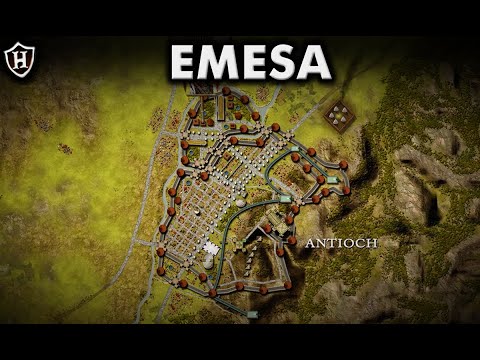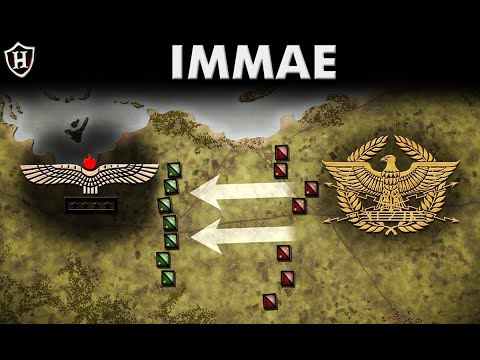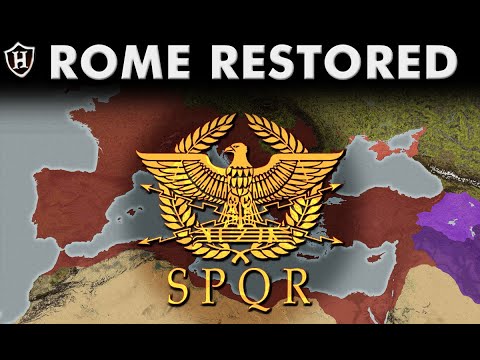Rome’s last stand in Egypt – Battle of Heliopolis, 640 AD – Arab conquest of Egypt
🚩 Click https://betterhelp.com/historymarche for 10% off your first month of therapy with our sponsor BetterHelp.
🚩 Join over 4 million people who’ve met with a therapist on BetterHelp and started living a healthier, happier life.
🚩 Support HistoryMarche on Patreon and get ad-free early access to our videos for as little as $1: https://www.patreon.com/historymarche
🚩Big thanks to Eastern Roman History and Warhawk for collaborating with me on this video. Check out their awesome history content:
Eastern Roman History https://www.youtube.com/@EasternRomanHistory
Warhawk https://www.youtube.com/@WarhawkYT
📢 Narrated by David McCallion https://www.linkedin.com/in/david-mccallion-815ab1a6/
🎼 Music:
Instinct – Bensound
Impact Allegretto – Kevin MacLeod
Crypto – Kevin MacLeod
Epidemic Sound
Filmstro
📚 Primary sources:
Al Baladhuri, The Origins of the Islamic State, translated by Philip K. Hittil, Vols. II (New York: Columbia University, 1916).
History of the Patriarchs, Severus ibn al Muqaffaʿ, Alexandrinische Patriarchengeschichte von S. Marcus bis Michael I 61-767, nach der ältesten 1266 geschriebenen Hamburger Handschrift im arabischen Urtext, edited by C. F. Seybold (Hamburg, 1912).
John of Nikiu, The Chronicle of John Bishop of Nikiu, translated by R. H. Charles (London: Williams and Norgate, 1913).
📚 Scholarship:
Booth, P., ‘The Muslim Conquest of Egypt Reconsidered’ in Zuckerman, C. Constructing the Seventh Century, (Paris, 2013). 639-670.
Butler, A. J., The Arab Conquest of Egypt and the Last Thirty Years of Roman Dominion, Reprint 1978 (Oxford: Oxford University Press, 1902).
Howard-Johnston, J., Witnesses to a World Crisis: Historians and Histories of the Middle East in the Seventh Century, (Oxford: Oxford University Press, 2010).
#byzantine #documentary #historymarche





🚩 Click https://betterhelp.com/historymarche for 10% off your first month of therapy with our sponsor BetterHelp.
🚩 Join over 4 million people who’ve met with a therapist on BetterHelp and started living a healthier, happier life.
Please finish the second punic war series it's the best series i have seen on this war i am following it from it's start.
Please do more about amazigh
Also, Egyptians loved Amr Ibn Al Aas more than the Romans and the Egyptian people allied with him against the Romans and they were the key for all his victories against the Romans. Even Coptic Christians loved Amr a lot. They were his spies against the Romans and they were opening the gates to him, giving him secret locations. God rest his soul. He was a great man. He was kicked out of leadership of Egypt by Uthman rw because he was drunk on power and refuses to take jizya from the Christians and he was going on the way to take Egypt and separate it from the caliphate.
Don't say arabs because they are Muslims despite the majority of them was arab
Any news of Hannibal Barca's series?
Abu Bakr didn’t fight in Yarmouk, in fact he was already dead at the time of battle. 1:19
There is one big problem with this entire video. It is wholly based on religious Islamic history and not "scientific" history. All these names, from Muhammed himself, the four rightly guided caliphs and them coming out of Mecca that didn't even exist, is simply not corroborated in any sources outside Islam, that wasn't even a concept at the time.
Yes, there was certainly an "Arab" expansion that originated much farther north, but it took at least half a century, if not two centuries or more for the emergent "Muslim" scholars to carefully censor everything else and finally write their own narrative, to fit into what became a somewhat coherent religion.
While it is the case of many historic events that we mostly get the story of the victors, when religion is involved, a channel that presumes to be about "history", should be extra careful when religious sentiments are taken into account. Every religion has a historical development, but taken Islamic accounts of what happened around 640AD, and written down much later, is almost in line with saying that we have historical evidence of the flood or the exodus of the Old Testament/Hebrew Bible. It's just that disputing the flood doesn't put you in danger of risking your life due to Jews and Christians deeming you a blasphemer these days.
No, we don't have many texts that tell the story from the Carthaginian or Gallic point-of-view, but nobody today worships Julius Caesar or Scipio Africanus as divine or prophets, and playing the devil's advocate against the Roman narrative is quite common among historians concerning those events.
The arabs (muslims) took mesopotamia before the Yarmouk battle.
The largest population in syria (palestine, syria, jordan, lebanon, today) where the arab tribes (the ghassanids and others). Even in north africa as the latest researchers found.
your voice on the commentaries are really cool and fitting 👍
Hannibal carthage best series continue
Excellent work.
Anyone else notice the bias tone and the misrepresentation of Muslims!!
My favourite part was the duel, I didn´t know about it; the Arabs were more brave so that they deserve Egypt.